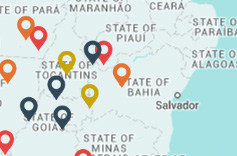Human Rights Defenders Institute – DDH
Combating human rights violations resulting from abuses of the provisional detainment regime within the Brazilian Criminal Justice system
Rio de Janeiro
Objetivos e público prioritário
Offer popular legal assistance to individuals and groups who suffer human rights violations because of state violence in the city of Rio de Janeiro. The project is mainly focused on cases of provisional detainment, with legal basis on “the guarantee of public order”, occurring both in the context of popular protests, especially related to sports mega-events, as well as that of residents of militarily occupied neighborhoods under the Pacifying Police Unit program – known as UPPs.
Main activities
– Legal assistance to provisional detainees;
– Training sessions with lawyers and project volunteers and partners affiliated with social and popular movements, non-profit organizations or public organs.
Context
Brazil, and more specifically, Rio de Janeiro, is living through a context of restructuring of the model of the city in an attempt to stimulate the participation of private initiative in urban infrastructure, placing the public authorities in the role of the manager of these investments. Because of this, the defense of “the public order” has become a central tenet of governability, materializing in the expansion of social control over the population in the urban space to guarantee the profitability of this private city-building project.
The setting of Rio de Janeiro’s new modernization and capitalization has been aggravated by the several mega-events the city will have hosted up until 2016. In 2013 there was the Confederations Cup and World Youth Day; 2014 saw the FIFA World Cup; and 2016, the Olympics.
Street protests also suffered the consequences of this model of the city and the mega-events. There has been an obstinate worsening of the official discourse in relation to protests, with the end of criminalizing the protesters.
According to data from the National Penitentiary Department – DEPEN, between June, 2011 (when the new law came into effect) and June, 2012, there was an increase of 6.3% in the number of provisional detainees. In the state of Rio de Janeiro, provisional detainment was imposed as a first measure in 79% of arrests in 2011, according to data from the Center for Studies of Security and Citizenship (Cesec). According to the same research, only 37.5% of the 3,672 arrests in 2011 (and whose trials had ended by January, 2013) were sentenced to full or partial imprisonment. This means that in 62.5% of the cases analyzed, the cautionary measure (provisional detainment) was evidently more severe than the definitive judicial sentence.
Other forms of violence, often by police, affect individuals and entire groups, as in the case of removals of favela communities, the military occupations by the State in UPPs (often planned via generic police search and apprehend operations over an immense area) and in aggression that result in bodily and/or psychological harm (whether lethal or not) to individuals or groups during public events.
About the organization
The Human Rights Defenders Institute (DDH) is a non-profit civil association founded in December, 2007, whose institutional mission is the development of programs to promote and defend human rights, especially through free legal assistance in paradigmatic cases of institutional violence and incarceration, as well as the development of training and capacity-building activities in human rights. It litigates in civil responsibility cases against the State in various instances of abuses of police activity, such as torture, summary executions and massacres. It has accompanied important cases such as the massacres of Acari (1990), Vigário Geral (1993), Baixada Fluminense (2005), Via Show (2007), Complexo do Alemão (2007) and Morro da Providência (2008).
The DDH had two other projects supported by the Brazil Human Rights Fund in 2008, 2011 and 2013.
Partnerships
The Popular World Cup and Olympics Committee of Rio de Janeiro.
Results
During the initial phase of the project, collaborative and training activities were held together with social movements to strengthen working as a network. In the second phase, focus was put on criminal litigation. The project offered legal counsel to people or groups who have suffered human rights violations as a result of state violence in Rio de Janeiro. It was mainly destined for provisional detention cases, with the “guarantee of public order” as legal basis, that occurred in the context of popular protests, especially those related to sports mega-events. It also covered cases related to residents in areas under military occupation by Pacifying Police Units (UPPs).
Funding Line
Criminal Justice / Rio de Janeiro e São Paulo (2014)
Year
-
Total Granted
R$ 276,900
Duration
24 months
Main Themes
Guaranteeing the rule of law and criminal justice






